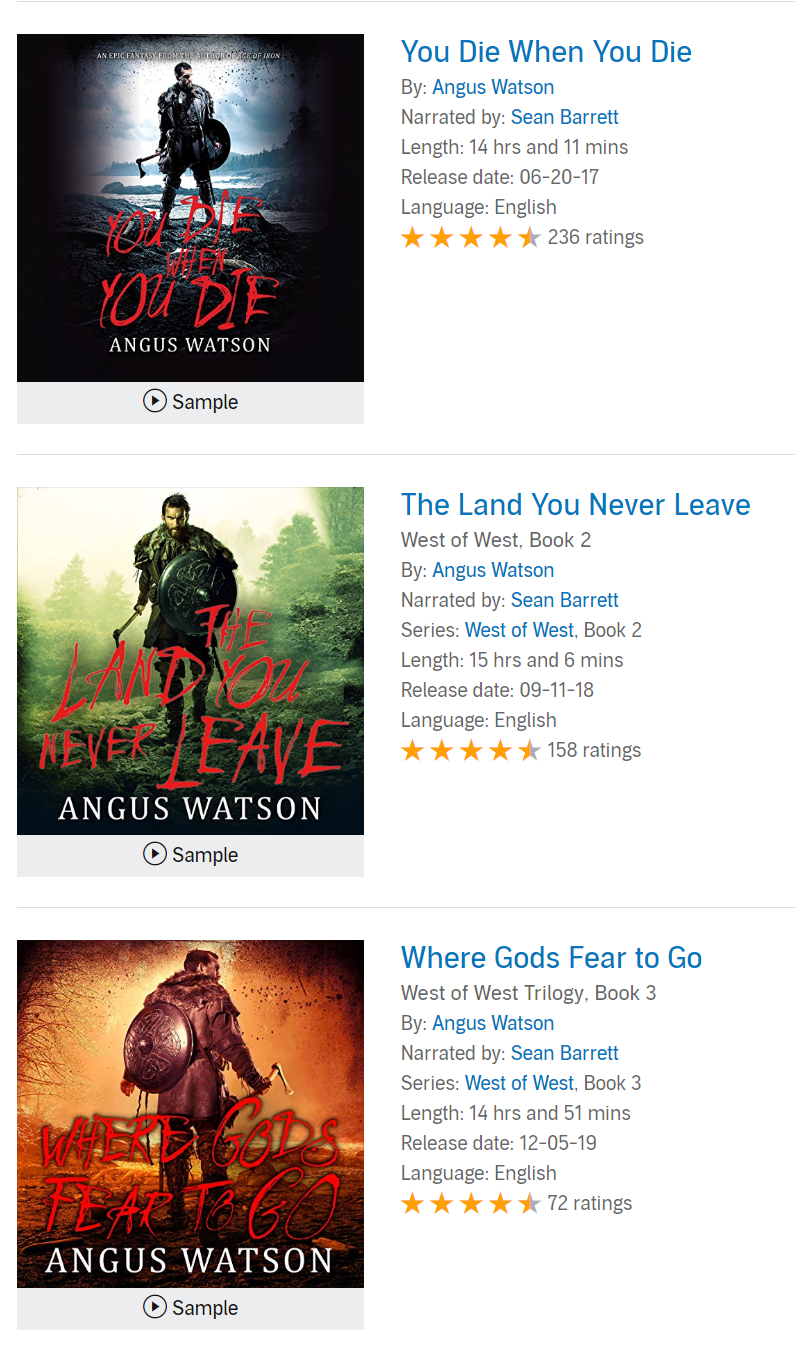I will always carry a fondness for Angus Watson’s West of West trilogy. These stories carried me through some terribly difficult months in my life.
I was working a stressful job up to sixteen hours per day, six to seven days per week. I often had to isolate myself so I could cry hot, salty tears of frustration and rage. I was angry most of the time. My alcohol consumption increased significantly. I stopped taking care of myself. It was putting a strain on my marriage and on my friendships. It was destroying my mental health and my physical health was following. I began having chest pains almost daily though my doctor said he could find nothing wrong with me physically. Anxiety attacks, an event I had experienced only twice previously years ago and had no idea what they were at the time, became a weekly threat. At some point, I do not know precisely when, I began experiencing suicidal ideation. The first time it happened, I was walking on the sidewalk outside my office building. A city bus was heading full speed in my direction and I thought, I can just step into the street and it will all be over. I had stopped walking and was standing nearly on the curb. The bus whipped past me, buffeting me with hot wind and a cloud of filthy exhaust that choked me. It took me a moment to realize however that it was not exhaust that was choking me but phlegm. As I gagged and struggled to swallow, I became aware that my face was wet and my nose was running. I was sobbing and only just beginning to realize it. I wish I could say that was the wake-up call, but it wasn’t. This type of thing continued for months, perhaps more than a year. It was frightening. I didn’t know what to do about it. I just knew that for the vast majority of my breathing hours, I did not want to be here anymore.
Then on May 3, 2018, I discovered You Die When You Die and it may very well have saved me.
I generally prefer physical books — I enjoy the tactile experience — but I had recently subscribed to Audible at the insistence of my friend Jeff. I had read a review of You Die When You Die that touted its humor and imaginative fantasy setting. Being a fantasy fan since childhood and needing some humor right about that time, I pressed downloaded the You Die When You Die audiobook and pressed Play.
Initially, I listened only during my commutes to and from work and at some point, I realized that the heavy sense of dread I had been feeling during my drives to work abated until I actually parked my car rather than starting when I locked the front door of my apartment. Then I started listening on the rare occasions I managed to force myself to step out of the office and take a short walk. Listening to Sean Barrett’s playful portrayal of the diverse characters, the sometimes crass and sometimes clever humor, and the incredible journey undertaken by the cast of characters so completely transported me to Angus Watson’s fantasy world that I was temporarily relieved of what felt like the insurmountable challenges I was facing. I laughed freely for the first time in a long time and suicidal ideation began to materialize less often.
In You Die When You Die, Angus Watson introduces readers to a vast number of characters with distinct personalities, speech patterns and language, and behaviors. As performed by Sean Barrett, these became a diverse population of real people. Even little Freydis the Annoying and Ottar the Moaner have their own childlike voices. My favorites have to be Wulf the Fat because he makes me laugh, and Finnbogi the Boggy who is young and confused and earnest and wants to be a shining warrior like the brave men of his tribe. Legend says Finn’s people were delivered to their land from across the sea, led by the great Olaf Worldfinder. They are an honorable people of tradition and virtue, but are growing happy and comfortable and complacent in their humble village of Hardwork. They also believe, some of them anyway, that young Ottar the Moaner is a prophet and only his sister Freydis the Annoying can understand his incoherent ramblings. Ottar, through Freydis, says the Empress of the mighty Calnian Empire has ordered the genocide of the Hardworkers because she believes they will be the source of world destruction. She sends her elite Owsla, an all-female squad of alchemically-enhanced warriors led by the ruthless and cunning Sofi Tornado, to annihilate Hardwork and everyone in it. Freydis claims Ottar’s visions dictate they must travel far to the west and then even farther west than that, over the dangerous Water Mother, across the Ocean of Grass, through the Badlands to salvation.
During the course of the trilogy, Watson and Barrett lead readers and listeners on an exciting race across the continent filled with colorful characters, through a fascinating fantasy landscape loosely based upon a real world region. I won’t say which because I do not want to spoil it for those who want to discover that realization for themselves.
I am sure the dialogue and characters are wonderful on the printed page, but as I listened to the entire trilogy on Audible, I must take this opportunity to once again launch Sean Barrett’s name into the sky. There is so much humanity in his delivery. His voice drips with charm and wit and kindness. It was so easy to picture myself sitting at a fireside tavern table, tankard of ale in hand, listening to a traveling bard regale tavern patrons with this epic tale of Hardwork and hardship. I think he would have a Gandalf-style pipe.
I finished listening to the third novel of the trilogy, Where Gods Fear To Go, a couple of months ago shortly after I made the decision to leave the job that was slowly dismantling me. I wrestled with the decision for well over a year even after I had made up my mind. To say Finn and his allies helped me through my own epic journey toward salvation is melodramatic, but I won’t say I’m not saying that. To have completed that journey myself and then experience the satisfying conclusion of the story was one of those life moments paralleling art.
Even the titles seem to have coincided with my own path. With You Die When You Die, I had was dealing with a combination of feeling as though I were resigned to my fate of working sixteen-hour days and feeling as though the only way to escape it were the end of life. In the novel, Finn and the survivors of Hardwork begin the journey west, pursued by the lethal Calnian Owsla warriors. By the time I listened to the second novel of the series, The Land You Never Leave, I was at the bottom of a mental and emotional abyss that felt inescapable. As in the novel, however, I had allies who helped me fight my deadly foes and held me aloft when I felt sure to fall. Despite my challenges or hopefully because of them, I was developing strength just as Finn begins to realize his full potential. Then, just before listening to the series finale, Where Gods Fear To Go, I finally left my toxic career. I battled a gauntlet of thoughts and emotions that threatened to cut me down even though I had taken the leap to freedom. I felt as though I had abandoned my team at work, people with whom I had worked so closely for fourteen years. I thought I had friends there. I felt I was betraying them, but to save myself, I had to go. I feared leaving my job would further strain my marriage, break apart my family, destroy us financially. In the novel, Finn and his allies endure similar trials that threaten to sever their alliances. Just as I battled myself within, Finn’s group suffers internal division and betrayal with sensations of distrust and anxiety coursing through the refugees. In the face of it all, they persevere, fight on, nearly drown in their own blood and sweat and tears, but by the gods, they go anyway. So did I. Just as Finn and his allies suffer casualties along their perilous journey, there are people about whom I cared who are no longer in my life because of the path I traveled, but this was a journey of self-preservation and it had to be taken.
We made it west of west. Sure, the sun sets in the west and darkness falls, often symbolizing the end of something, but if you continue traveling west of west, you make it back around to a new dawn. A new opportunity. Renewed.
Thank you, Angus. Thank you, Sean. Thank you, Orbit Books and Audible. Wootah.


